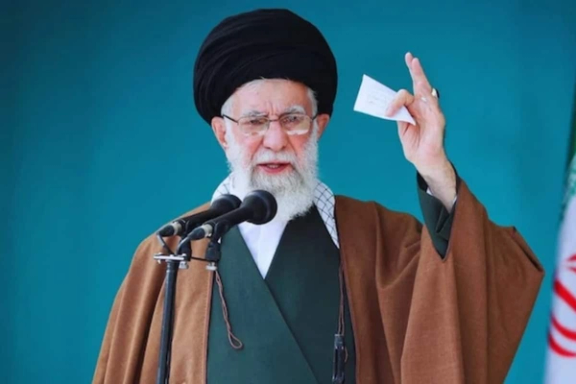Q&A: What was Khamenei’s role in the 2015 nuclear deal?

Supreme Leader Ali Khamenei, with ultimate authority over Tehran’s nuclear policy, combined strict oversight with cautious deniability in the lead-up to the 2015 nuclear deal—using a dual strategy to safeguard domestic credibility while retaining international leverage.
Q: How and when did Khamenei approve the 2013 nuclear talks?
On September 17, 2013, Supreme Leader Ali Khamenei signaled his approval for nuclear talks with world powers, using a religious analogy in a speech to suggest that "flexibility" is sometimes necessary to achieve victory against adversaries.
Two weeks later, he expressed support for the diplomatic initiative of then-President Hassan Rouhani’s administration in another speech.
Between April and July 2015, as nuclear talks neared their conclusion, Khamenei cautioned military officials against allowing "aliens" to inspect military facilities "under the guise of supervision and inspection." He warned against halting Iran’s defense development or permitting the interrogation of Iranian nuclear scientists. Khamenei also pledged continued backing for the Islamic Republic’s "friends in the region," including the "peoples" of Palestine, Yemen, Syria, Iraq, Bahrain, and Lebanon.
Additionally, Khamenei insisted that all sanctions, whether imposed by the United Nations or the United States, must be lifted immediately once a deal was finalized.
Q: What role did Khamenei play in the 2015 nuclear deal?
Khamenei has consistently claimed that he was not directly involved in the details of the nuclear negotiations with world powers, which began in November 2013.
However, officials’ statements suggest that the negotiating team regularly reported to him, followed his instructions, and adhered to the “red lines” he established. A deal, by all accounts, required his ultimate approval.
In July 2013, Khamenei showcased his in-depth knowledge of the negotiations, citing technical terms and specific figures during a speech to government officials.
“Regarding the enrichment capacity, they aim to make the Islamic Republic consent to 10,000 SWU, but they began by demanding a limitation to 500 SWU or 1,000 SWU. 10,000 SWU is produced by the 10,000 old-type centrifuges we had and still have. Our officials say we need 190,000 SWU. This is the country’s definite need,” he said.
SWU (separative work units) refers to the amount of separation achieved in the uranium enrichment process.
Q: Did Khamenei accept responsibility for the 2015 nuclear deal?
Khamenei avoided taking direct responsibility for the nuclear deal, deferring its final approval to the conservative and hardliner-dominated Parliament. He neither explicitly endorsed nor opposed the agreement.
Speaker Ali Larijani expedited the parliamentary vote, reportedly acting on Khamenei’s instructions, and blocked debate on the legislation despite objections from hardliners. The deal passed with 161 lawmakers voting in favor, 59 opposing, and 13 abstaining.Some reports claimed that Khamenei had conveyed his desire for the deal’s approval through Asghar Hejazi, an official in his office. However, the office issued a statement denying such allegations.
Q: When did Khamenei first publicly criticize the 2015 nuclear negotiation team?
After the US withdrew from the nuclear deal – formally known as the Joint Comprehensive Plan of Action (JCPOA) – in May 2018, Khamenei described the negotiations as a mistake in an August speech.
He stated that he had permitted the talks because senior officials, likely President Hassan Rouhani and his negotiation team led by Javad Zarif, had insisted on pursuing them.
In the same speech, he accused the negotiators of crossing the “red lines” he had set.
Q: Has Khamenei issued a fatwa prohibiting the development of nuclear weapons?Iran's government has consistently stated that it will not pursue nuclear weapons, citing a fatwa (religious edict) by Supreme Leader Ali Khamenei banning all weapons of mass destruction, including nuclear arms.Iranian officials first referenced Khamenei’s fatwa at an IAEA meeting in Vienna in August 2005 and reiterated it at the International Conference on Nuclear Disarmament in April 2010.
According to Khamenei’s official website, Iran’s mission later pledged to submit a translation of the fatwa in several languages to the UN for registration as an official document.
In an October 2019 speech, Khamenei declared that building and maintaining nuclear weapons is "absolutely haram," meaning strictly forbidden under Islamic law. He stated that although Iran had the capability to develop a bomb, it chose not to. He emphasized there is no justification for pursuing a weapon that is religiously prohibited.
However, analysts argue that the so-called fatwa is merely an advisory opinion rather than a binding legal decree. They argue it was intended to mislead the international community about the true intentions of a nuclear program that Tehran insists is peaceful.
Q: Can Khamenei’s ‘nuclear fatwa’ be overturned?
Fatwas are issued by Shia Marja – senior clerics recognized as sources of emulation in Islamic jurisprudence.
Skeptics say that such fatwas are not immutable; they can be revised or revoked based on the “requirements of time and place.” This principle allows rulings to adapt to new circumstances, as shown by historical instances where one Marja or another has altered earlier decisions.